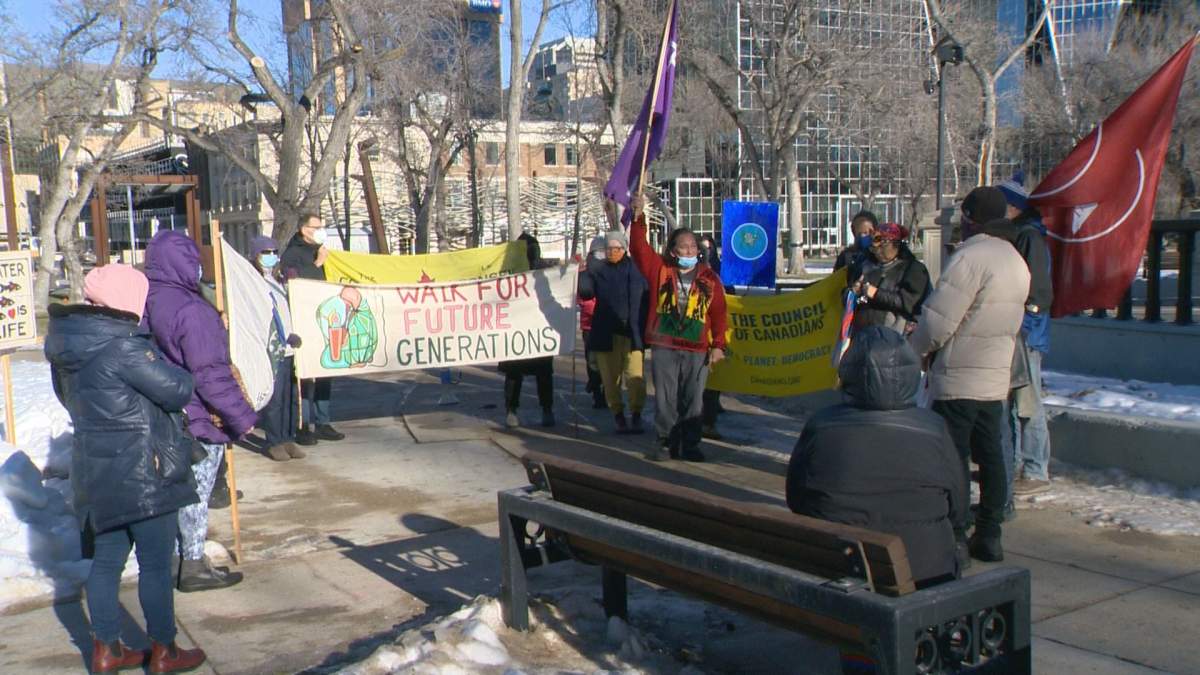A rally in support of Wet’suwet’en protesters against the Coastal GasLink project, which would run through Wet’suwet’en territory, took place Saturday afternoon at Victoria Park in Regina on Treaty 4 land.

About two dozen people gathered in the park. The event was partly organized by local Indigenous activists and the Regina Chapter of the Council of Canadians.
On Friday, Nov. 19, B.C. RCMP arrested 15 people, including two journalists, as they moved to enforce an injunction.
Among those arrested were award-winning photojournalist Amber Bracken and documentary filmmaker Michael Toledano, who have both since been released.
The RCMP was enforcing a B.C. Supreme Court-ordered injunction that stops opponents from impeding access to Coastal GasLink’s activities, permitted under Canadian law.
The day prior, RCMP said they were preparing to “rescue” more than 500 workers “trapped” by a blockade that aims to stop a pipeline’s construction on unceded First Nations land.
Several days prior, the Gidimt’en Checkpoint, which shares information about the blockade, tweeted that the Wet’suwet’en Nation had successfully enforced its “ancient trespass laws” and closed the territory.
“Police were deployed in military garb, armed with assault weapons and dog teams, and enforced a media and communications blackout at the site. First, a cabin was breached with an axe and dog unit,” Sleydo Molly Wickham said in a statement.
“Moments later, a separate cabin built on Coastal GasLink’s proposed drill pad site was breached with a chainsaw and snipers aimed at the door,” the statement goes on to read.

Get breaking National news
Wickham has been the main spokesperson for the Gidimt’en checkpoint for several years and is also a member of the Gidimt’en Clan within the Wet’suwet’en Nation.
In the statement, she writes that RCMP did not have warrants required to enter either dwelling and that after raiding Coyote Camp, police swept through Gidimt’en Checkpoint and made more arrests.
In the same statement, Wet’suwet’en hereditary Chief Woos said, “I do not see any reconciliation in this. For our brothers and sisters of all Indigenous organizations, let this be a sign that reconciliation in their eyes is really the White Paper in disguise.”
“Gidimt’en strongly condemns the repeated violations of Wet’suwet’en jurisdiction and Wet’suwet’en law in the middle of unprecedented climate-induced floods, storms, and a provincial state of emergency,” the statement adds.
Community members at Saturday’s rally said they’re appalled by the “violent” and militaristic actions recently taken by RCMP to arrest Indigenous land defenders, even members of the media and others fighting to protect natural resources in the northwest B.C. area.
“For everybody that’s fighting land extraction and resources, these are our life resources,” said Thunderbird Thunderwoman, one of the organizers of the rally.
The members of the Wet’suwet’en Nation and supporters have been fighting against the Coastal GasLink natural gas pipeline for several years, with RCMP responding to similar blockades being set up to block construction in January 2019 and 2020.
“Our ecosystems are sick, the world knows this and the world is saying what are we going to do about climate change?” Thunderwoman said.
“So, this is what we’re doing, we’re trying to stop pipelines … we’re trying to stop mines, we’re trying to push for sustainability. We’re not standing in the way of progress, we just don’t want to degress.”
Thunderwoman said she has been in contact with those protesting in Wet’suwet’en and says the people she knows are peaceful and have pure intentions, not being guided by “greed.”
“We are from a matriarch, so, in a matriarch there is no war, we don’t have a military at our service, unlike Canada, who have RCMP all militarized,” Thunderwoman stated.
She goes on to say that local residents will continue to support those who are on the ground protesting on the First Nation territory in B.C. until a sound and environmentally just resolution can be reached between the protesters and the Canadian government.
The Wet’suwet’en are a northern B.C. First Nation who have never signed any treaty or given up the rights or title to their land.
In 1997, the Supreme Court of Canada ruled in the Delgamuukw-Gisday’wa court case that the Wet’suwet’en had not given up the rights or title to their land.
According to a report from the BC Treaty Commission, the ruling means that the “aboriginal title does exist in British Columbia” and that “when dealing with Crown land, the government must consult with and may have to compensate First Nations.”
While several elected chiefs on reserves have signed onto the Coastal GasLink Project, the hereditary chiefs remain set against it.
The Wet’suewet’en hereditary chiefs have long maintained that the elected band chiefs do not have the jurisdiction to speak on behalf of the nation and that the hereditary chiefs, an independent governing body that represents the clans within the Wet’suwet’en Nation, do.
— with files from Global News’ Elizabeth McSheffrey, Sawyer Bogdan and The Candian Press








Comments